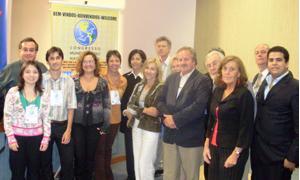|
|
World Congress of Peace in the Americas
an article by Marcos Estrada and Renata Cueto de Souza
World Congress of Peace in the Americas
by Marcos Estrada and Renata Cueto de Souza
From the 10th to the 15th of August 2009, the Brazilian city of Santos
hosted the First World Congress of Peace in the Americas, organised by
the Brazilian Association of Folklore Festivals Organisers and Popular
Arts (ABrasOFFA).
The event was aimed at people working in issues related to
peace building, resolution of conflicts and human rights. All the
activities were open to the public, promoting an opportunity to
exchange experiences, dialogues and initiatives to strengthen peace.

International participants in the Congress
Every day between 150 and 180 people, in a wide 6-85 age range,
attended the activities. The opening took place at the Coliseu Theater,
with the participation of Helena Lourenço – President of the Peace
World Congress in the Americas, and guest speakers at the congress
David Adams – ex-Director at the UN; João Paulo Tavares Papa – Mayor of
Santos; Lia Diskin – President of Palas Athena Association; Hans Holz
-General Secretary of IOV (International Organisation of Popular Arts);
Alicia Cabezudo - Visiting Professor at UPEACE; Professor Magnus
Haavelsrud; Dina Rodriguez - Director of the Department for Gender and
Peace Studies at UPEACE, who were joined by workshop coordinators
Marcos Estrada - International Relations of IBEV and former UPEACE
student /Peace Education 2007/08, and Renata Cueto de Souza – Peace
educator and current postgraduate student at UNIPAZ/Brazil.
Among the lectures and discussion groups that were held during
the week, there were those by Professors Cabezudo and Haavelsrud on
“Educating Cities”, followed by workshops conducted by Dr. Adams, Ms.
Souza and Mr. Estrada, the latter leading the children’s workshop. The
outcomes of this workshop could be seen by drawings prepared by the
young participants.
In a meeting at SENAC/Santos (National Service for Commerce
Education) attended by the guest speakers and coordinators, Jorge
Carlos Silveira Duarte of SENAC, explained how the institution has
already implanted some of the concept of Culture of Peace in its local
development programs – which was acknowledged by Dr. Adams – and is
currently increasing its actions in Latin America and the Caribbean.
According to Ms. Lourenço, the ultimate goal of the Congress
was to multiply the concept of Culture of Peace in the schools of
Santos, reinforcing its status as an Educating City: “The idea was to
introduce it to the local government and we managed that. We had a
meeting with the Vice-Mayor and he liked very much what he saw.”
On the last day of the event, Mr. Estrada presented the Earth
Charter and Ms. Rodriguez delivered a lecture on the Peace Education
course taught at UPEACE. The event ended with the performance of a
folkloric group, as it had happened on a daily basis. It is important
to highlight the work of the 78 Amarelinhos (yellow jackets)
volunteers, who played a vital role in the general organisation. The
event often appeared in the news - TV channels, radios and newspapers –
and it was broadcast live on the Internet. For more information, visit www.qik.com/vivoeduca or contact ABrasOFFA at abrasoffa@abrasoffa.org.br.
|
|







 |
DISCUSSION
Question(s) related to this article:
Global meetings, conferences, assemblies
What is the best way for delegates to interact afterwards?
As a reader, you are invited to join in the discussion of this
article based on any of the above question(s): just click on the
question, read the previous comments and add a new reply. You may also
enter a new discussion topic on this article - see bottom of this page.
Thematic forum(s) in which this article is being discussed:
GLOBAL MOVEMENT FOR A CULTURE OF PEACE
LATEST READER COMMENT:
"to
maintain the momentum achieved during these mobilizations so that
participants can remain active and connected with each other and with
the Global Movement as a whole" is a crucial issue that few youth
NGOs have ever achieved yet. . .
nice websites with profiles,
some chatting, but little action or dialogue, little visible
inspiration or local down to earth outreach...
maybe check this approach: highlighting "who does and achieves what, and how, and how to copy it" in lively format. http://www.pnyv.org/index.php?id=218; http://www.pnyv.org with an instrument and format to install it in the biggest multiplier of all: public school hallways. http://www.pnyv.org/index.php?id=467 with status of Official Proejct of the UN Decade of Edu for Sustainable Development in coop with http://youthactionforchange.org for free online courses on global issues.
We
have piloted pnyv! for some years with great feedback, yet not promoted
because we first want to have a solid office to be able to
respond to requests about special editions, local editions etc...
SO, we are doing research in Berlin for setting up an office
where we can have some stable staff to do basics while the
hundreds of online volunteers (translators, editors, web editors)
keep buzzing.
We have talks with a great culture centre this
september, after i return from latinamerican-european youth networking
in barcelona, and we are preparing several EU fundign proposals incl.. . ...more.

|
|





